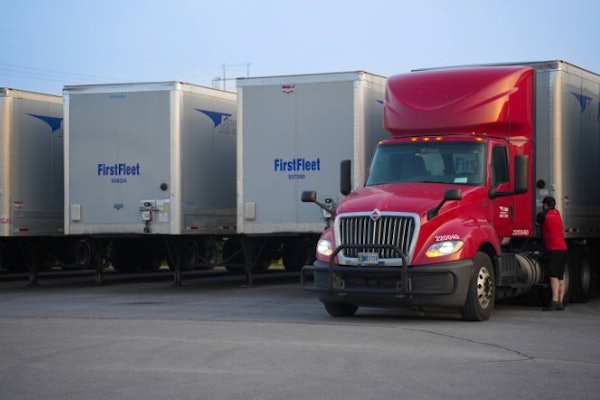A spokesman for U.S. Sen. Dianne Feinstein, D-Calif., said today, April 27, that the Bush administration had decided to comply with legislation passed this week that would impose conditions on the U.S.-Mexico cross-border trucking plan.
The U.S. Department of Transportation refused to confirm that any concessions had been made or that the plan had been postponed but today issued a two-sentence statement saying the agency continues to “fine-tune” the plan.
Feinstein spokesman Scott Gerber told Overdrive that the senator’s office was told by DOT earlier in the week “that Mexican trucks won’t be allowed to enter the country until trucks from the United States are allowed to enter Mexico.”
DOT declined to comment beyond its two-sentence statement: “Our efforts to begin the cross-border truck demonstration program remain on track as we continue to work with our partners in Mexico and Congress to fine-tune the implementation strategy. Our goal is the same as it has always been, developing a cross-border trade program that is as safe and efficient as possible so consumers can enjoy lower costs, truckers can benefit from increased business opportunities, and both our economies can continue to grow.”
Federal Motor Carrier Safety Administration spokesman Ian Grossman declined to elaborate on what issues would be addressed in the fine-tuning or how long it would take.
The announcement marked the end of a tumultuous week for the administration’s plan to let Mexican trucks haul freight deep into the United States, as was pledged years ago in the North American Free Trade Agreement. The Bush administration announced in February that 100 initial Mexican trucking companies would be allowed to travel beyond the current 20-mile limit, perhaps as early as May.
On Thursday, April 26, an amendment that could halt the plan passed the U.S. Senate as part of Congress’ $124 billion Iraq war spending bill. The same bill, complete with the trucking amendment, had passed the U.S. House on Wednesday, April 25. The amendment, sponsored by Feinstein and U.S. Sen. Patty Murray, D-Wash., would require that congressional mandates be met and that simultaneous Mexican access for American trucks be granted before proceeding with the plan.
Capitol Hill, however, was not the only place where legislators wanted to put the brakes on the cross-border trucking plan. The Mexican Senate, troubled by claims that U.S. trucks were on the verge of flooding the country, voted Wednesday to negotiate a delay of the program until July, during which time it could be tweaked in various ways.
The proposal by Sen. Rogelio Rueda Sanchez would create a board of Mexican officials and business executives to monitor the U.S. program to ensure it is in accordance with NAFTA and to analyze the efficiency of the FAST lanes being implemented at U.S. border crossings. Moreover, the proposal asks the Mexican secretary of transportation to negotiate changes to make sure the program equally benefits truckers from both countries, including making sure the same number of carriers from each country are involved.
Earlier in the week, a coalition of U.S. opponents of the plan sued DOT in federal court in California, charging that the impending “demonstration,” as administration officials call it, is actually a “pilot program,” one therefore subject to federal laws requiring public notice and comment periods. “We have strongly opposed this program since first introduced, and in particular, the secretive nature in which it has been presented by the DOT,” said Todd Spencer, executive vice president of the Owner-Operator Independent Drivers Association, one party to the suit.
Joining OOIDA were the Teamsters union, Public Citizen, the Sierra Club and the Environmental Law Foundation. The plaintiffs also charge that DOT has not complied with congressional requests for clarification of how exactly the agency would verify Mexican drivers’ records, test for drugs and alcohol abuse, and ensure compliance with hours-of-service, cabotage, inspection and insurance rules.
Mexican trucks had free run of the United States until 1982, when Congress closed the border to both Canadian and Mexican trucks until U.S. trucks obtained equally free run of those nations. Canada quickly complied, but Mexico did not, and the issue of Mexican trucks in the United States has dragged on ever since. NAFTA — a treaty signed by Canada, Mexico and the United States in 1994 — pledged to open borders to all businesses, including trucking companies.








